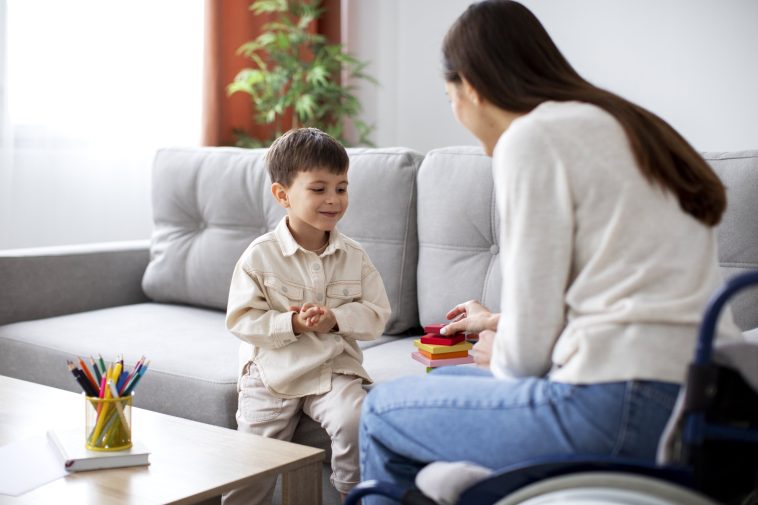One of the basic skills of human life is communication. It’s how we express ourselves and how we understand the world around us. When you encourage a child to become a good communicator, it helps them to express their feelings and thoughts, do well in school, and be understood by other people.
Having said that, it is also true that some children will require additional help to reach developmental milestones for their age. Almost 8% of children experience challenges in communication as they grow up. These individuals often require professional intervention, such as speech therapy, to overcome particular hindrances or obstacles.
Speech and language therapy for children focuses on receptive language (the ability to grasp words spoken to you) and expressive language (the ability to express yourself through words and sentences). This therapy also deals with the mechanics of using words along with volume, fluency, articulation and pitch.
How speech therapy helps children
Speech therapy can aid children to express their opinions, needs and wants, as well as grasp both nonverbal and verbal language. This therapy can help decrease the frustration of children or the emotional issues they suffer due to delays in speech and language.
Such therapies can also aid children in reaching goals around functional communication like the expansion of vocabulary, comprehension abilities, sentence structure, skills of social communication and other vital elements which can impact their academic and day-to-day life.
When a child is helped to improve their communication abilities to an age-suitable level, it sets them up to accomplish future milestones. Since many of these goals build on each other in a sequential way, early intervention can aid in growing and improving the communication of a child such that they don’t fall behind further.
Issues treated by speech therapy
Some of the common areas and kinds of speech therapy are as follows:
- Articulation therapy: This helps children to produce sounds
- Language therapy: Helps with pragmatic language, receptive language, expressive language, etc.
- Fluency disorders: Helps with stuttering problems
- Voice disorders: Helps those with voice problems
- Disorders of cognitive communication: helps children with higher level thinking and specific language skills
- AAC (Alternative and Augmentative Communication): Assists children who need alternative modes of communication, like electronic devices, exchange of pictures, etc., for more effective communication
- Dysphagia therapy: Helps with swallowing problems
- Early intervention: Treatment of babies and children aged 0 to 5
- Therapy for paediatric feeding: Helps with feeding issues. This includes the oral (chewing) or swallowing phase
- Oral-motor: Helps in improving coordination and movement of jaws, tongue, and lips for feeding as well as producing sounds
What is a speech-language therapist?
An SLP (Speech Language Pathologist) or Speech Therapist is a healthcare professional who evaluates and treats language, speech, cognitive communication and feeding/swallowing disorders. They can work with both children and adults. It is easy to find an SLP by searching online for speech therapy near me.
Children can often begin speech therapy when their parent/caregiver or paediatrician has identified a delay in their current communication abilities. It is the SLP, who has responsibility for diagnosing the challenges of the child and setting goals, to help them in the growth of speech and language abilities.
Warning signs of issues
It is critical to observe the child’s communication development right from birth. Fortunately, speech issues can be detected even before babies say their first word. An early sign of the baby making progress in communication is revealed by the strength of their early non-verbal communication.
Some of the early signs of language include:
- Joint attention: the baby can focus on a shared object with other people
- Baby maintains eye contact and responds to gestures and sounds
- Baby engages in play activities
- They can vocalise with babbling or other sounds like cooing
If a baby does not seem to meet the above mentioned age appropriate milestones, it may feel frustrated. Several behavioural issues in their younger years may result from their incapacity to communicate needs and wants.
When there is a delay in the development of language skills, children may appear to be ‘trapped’ at a single stage, like using crying or gestures to communicate rather than words. Such an audible and visible frustration may indicate that the child requires additional support to improve their speech and language skills.
Identifying the need for speech therapy
All humans have universal stages of early development for language. The baby progresses from simply crying to cooing and babbling and then to their first words. Such foundational skills reflect maturation and growth of brain development. They are critical to constructing more complicated abilities of language, which permit children to express ideas, feelings and thoughts clearly.
Delays in language and speech occur when children don’t reach milestones linked to their age. These comprise of typical developmental concerns, such as delayed speech, impacting nearly 10% of preschool children and 3% of older children.
Having said that, it is also true that each child has a development timeline. Though stages of communication are universal, there are differences among all children, when and how they meet them.
Hence, it is challenging for parents and caregivers to know whether a child is only a late bloomer or whether they need professional intervention. Though one might want to adopt a ‘wait and see’ approach, there is the danger that one might neglect an early warning sign of potential problems.
The decision to undertake speech and language therapy should be made by a licensed SLP only after a formal diagnosis. If you have a specific concern about a child’s speech and there are no improvements in a few months, it is wise to consult a speech therapist.
In sum, certain speech and language issues resolve with time in childhood. Others can persist to adulthood and may need long-term therapy. Only after a formal evaluation can an SLP recommend the kind, time, and frequency of treatment.




